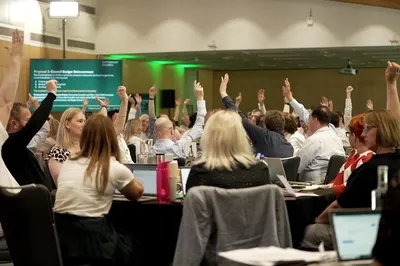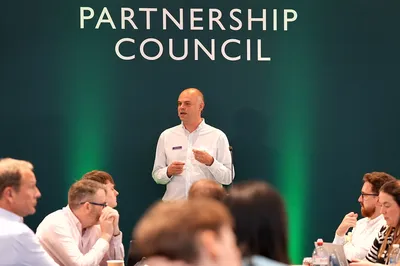Our learnings from the John Lewis Partnership Council Meeting
We were delighted to be invited back to the most recent John Lewis Partnership Council Meeting, following our visit last year. Once again, we gained some really valuable insights to bring back to our own co-ownership journey.
Here are our learnings from the day:

Intentional democracy
One of the most interesting aspects of the day was just how intentional and structured John Lewis’ approach to democracy is. It’s embedded deep in the culture and operations of the business.
The meeting room was set up with large round tables where elected council members, ranging from Waitrose shop floor staff to senior John Lewis managers, sat together. The presence of the Democratic Vitality team at each table, a dedicated group whose role is to foster democracy and train council members, also reinforced this commitment. The team empowers representatives to confidently ask challenging questions and engage constructively.
Before the main meeting day, council members had met without senior leadership or observers to review the agenda and prepare. Documents and reports had been circulated well in advance, enabling representatives to arrive informed and ready for discussion. The meeting was also live-streamed and recorded, ensuring full transparency for anyone across the organisation unable to attend in person.
Empowered voices and psychological safety
One of the most powerful takeaways was witnessing how confidently people from all levels of the organisation stood up and asked direct, often difficult questions in front of senior leadership. This was not a defensive environment; it was clear that senior leaders genuinely welcomed scrutiny and challenge.
This was only possible due to the psychological safety in the room, a fundamental cornerstone. The senior leadership team showed real respect for the council members and their questions. The Partnership invests heavily in training council members, covering everything from how to influence without authority to framing counter-questions, gathering peer opinion, and acting as representatives rather than delegates.
An important point we learned from our conversation with Matthew Heap, Partner & Democratic Vitality Consultant Lead, is that the council turns over completely every three years. This approach means that members grow together over time, building confidence and capability collectively. We were seeing a cohort at the end of its cycle - and it showed!

Structured discussion with purpose
In the afternoon, the structure of the discussion revolved around the Partnership’s three core values of 'Happier People', 'Happier Business' and 'Happier World'."
Council members reflected on how the organisation was performing in relation to these values, using specific examples. Each value was explored in depth, with questions raised and discussed in alignment with these aspirations. It was really clear that these values underpin decision-making and direction-setting.
Throughout the day, the partnership council Chair managed proceedings, while helpers tracked who had raised their hand to ensure no voices were missed.
Interestingly, votes didn’t always reflect the most vocal discussion points in the room. As Matthew explained, council members are expected to vote not based solely on personal views, but on what’s best for the business as a whole. This sense of collective responsibility is central to their democratic approach.
Fresh perspectives
Our visit offered fresh perspectives on our practices at Torchbox. While we may not need the same scale of infrastructure, the principles of intentionality and active engagement are deeply relevant.
We’ve made strides with initiatives like our "Talking Points" programme, but this experience highlighted opportunities to further develop psychological safety, open Q&A sessions, and engagement from leadership.
For example, during our company days, we invite questions both in advance and in person, but most are still submitted via a form ahead of time. This approach is valuable and ensures space for thoughtful and anonymous input, but over time, we’d love to build a culture where more people feel comfortable asking questions openly on the day too. As we saw at the Partnership Council, that level of openness requires trust, training, and leadership buy-in.
We were also struck by how well-organised the day was - discussions were rich, and always with clear purpose. There was plenty of time for reflection, but also clear mechanisms to reach conclusions and take action. Ongoing conversations, circulated documents, and pre-meeting discussions all contributed to a productive, purposeful event.
Our visit to the John Lewis Partnership Council meeting has given us fresh perspectives on what it looks like when democracy is actively built, invested in, and protected. It’s a model of intentional, well-organised, values-led leadership that truly reflects employee ownership.
A huge thanks to the John Lewis Partnership team for inviting us and giving us so much to take back to our own employee ownership journey.



